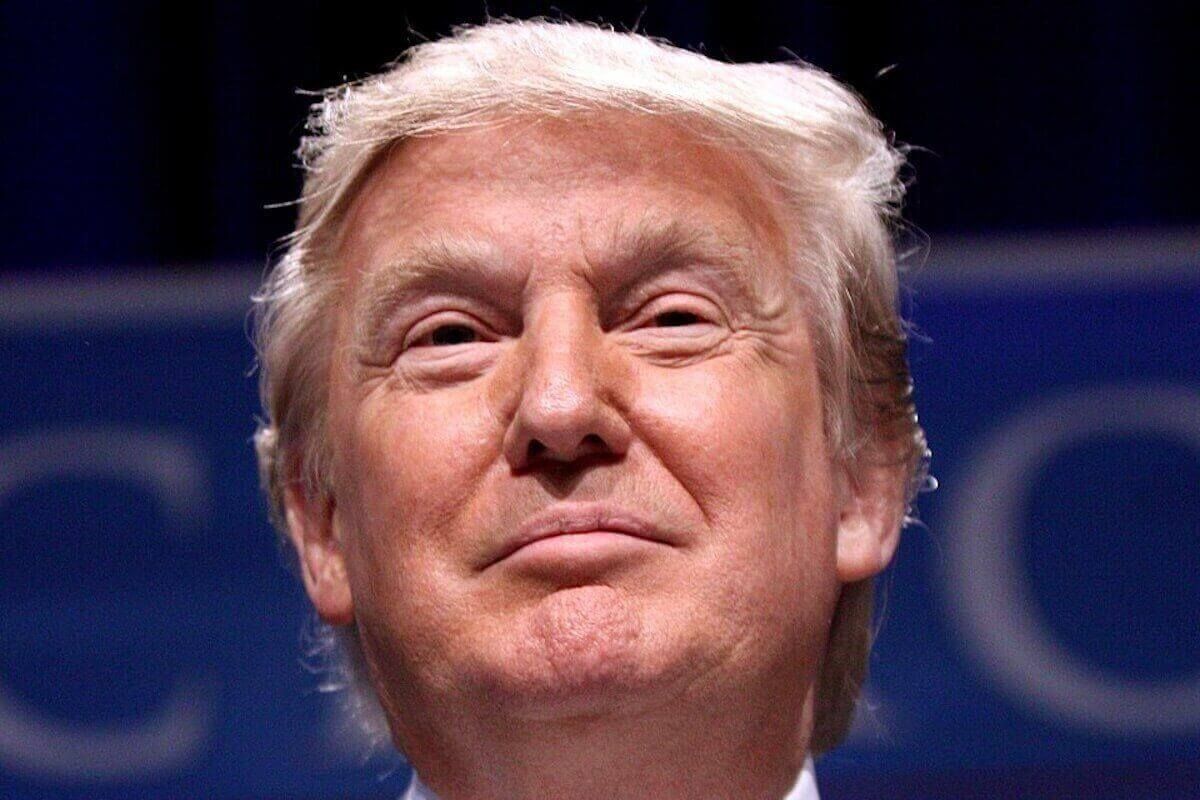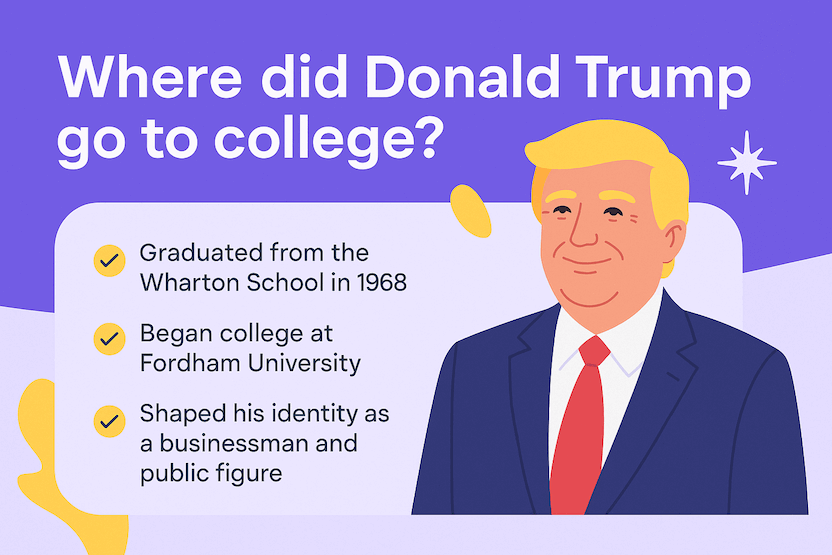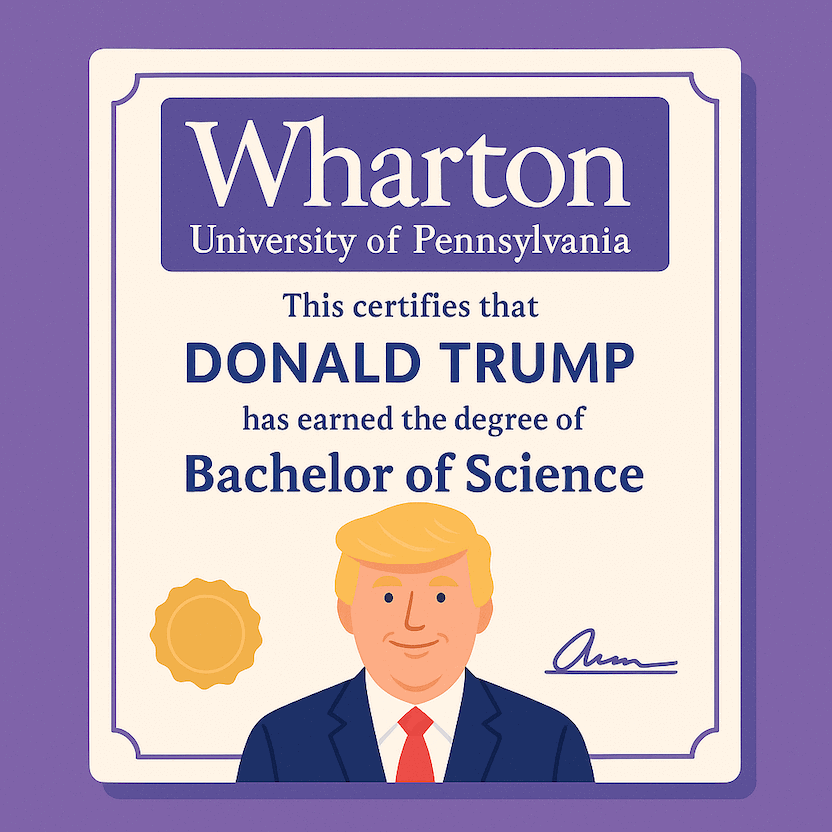Advertiser Disclosure
Last update: September 25, 2025
10 minutes read
Where did Donald Trump go to college?
Explore Donald Trump's academic journey through Fordham and Wharton, how his college experience influenced his business empire, and its impact on education and leadership.

By Derick Rodriguez, Associate Editor
Edited by Yerain Abreu, M.S.
Learn more about our editorial standards



By Derick Rodriguez, Associate Editor
Edited by Yerain Abreu, M.S.
Learn more about our editorial standards
Ever wondered where Donald Trump attended college and how his education influenced his rise to power? From military academy discipline to Ivy League credentials, Trump’s academic path is anything but ordinary.
In this post, we explore the schools he attended, the legacy he built, and what his story reveals about education and ambition, and how President Trump’s current 2025 education policies are redefining the meaning of an elite college degree.

Key takeaways
- Donald Trump graduated from the Wharton School at the University of Pennsylvania in 1968
- He began his college education at Fordham University in New York before transferring
- His education has shaped his identity as a businessman and public figure
Since his first election to the presidency in 2016 and again during his second campaign in 2020, Trump's educational background has remained a recurring talking point, used by supporters to highlight his business acumen and by critics to question elite credentials.
Early education and prep school
Long before he became a household name, Donald Trump was a student at the New York Military Academy (NYMA), a private boarding school where he enrolled at age 13.
Known for its disciplined environment, NYMA played a key role in shaping Trump's early persona. Trump later described the experience as “tough, but excellent training,” reflecting a preference for structure and competitiveness.

Starting college at Fordham
In 1964, Trump began his college studies at Fordham University in the Bronx. The Jesuit institution offered a strong liberal arts foundation, but after two years, Trump was ready for a different kind of academic experience, one with a sharper focus on business.
Transferring to Wharton
In 1966, Trump transferred to the University of Pennsylvania’s Wharton School of Finance and Commerce. At the time, Wharton was one of the few business schools offering a real estate concentration, which aligned closely with Trump’s ambitions in his family’s real estate business.
While much has been made of his Ivy League credentials, records indicate Trump was not especially prominent academically at Wharton. Still, he graduated in 1968 with a Bachelor of Science in Economics.
Despite some speculation over the years about his academic performance, Trump has consistently highlighted his Wharton degree as a major credential in both business and politics.
He has often emphasized that Wharton was “the hardest school to get into,” using it to counter criticisms of his intellect during both presidential runs.

The influence of his business education
Trump has repeatedly credited Wharton for sharpening his financial instincts. Over the decades, the "Wharton brand" became a central pillar in his business identity, from bestselling books like The Art of the Deal to his portrayal as a savvy tycoon on The Apprentice.
Interestingly, Trump has described himself as "a very smart guy" due to his Wharton background, often invoking it as evidence of intellectual rigor, even though the specifics of his academic achievements remain private.
As president, Trump leaned heavily on his Wharton experience as proof of business acumen, using it to frame policies around deregulation, economic nationalism, and tax reform.

TuitionHero Tip
Remember, there's no one-size-fits-all way to save for college, and what works for one family might be different for another. Visit TuitionHero.org for personalized advice and tools that suit your unique financial situation.
Legacy, honors, and academic controversy
Donald Trump has received multiple honorary degrees over his lifetime (e.g., from Lehigh, Wagner College, Robert Gordon University, and Liberty University)
However, almost all of these have since been rescinded, including those from Lehigh, Wagner, and Robert Gordon University, often following controversy or public pressure.
Liberty University remains the only institution that has not revoked its honorary degrees awarded to Trump (2012 and 2017).
However, his presence in academia is still felt. Courses in business ethics, political science, and media studies often include Trump as a case study, highlighting how educational influence can cut both ways: through formal achievement and public scrutiny.
Since his presidency, Trump has increasingly criticized elite colleges, including Ivy League schools like Harvard and Yale, for what he describes as "radical left indoctrination" and anti-American sentiment on campus.
This rhetoric has resonated with conservative voters and fueled a broader movement questioning the legitimacy and neutrality of U.S. higher education institutions.
Since returning to office in January 2025, Trump’s administration has frozen or cut research funding at several Ivy League institutions, including Columbia, Brown, and the University of Pennsylvania.
He has cited alleged campus antisemitism or DEI-related controversies as the reasons for these actions. In early August, funding was likewise suspended from UCLA following protests.
Compare private student loans now
TuitionHero simplifies your student loan decision, with multiple top loans side-by-side.
Compare Rates
Legal showdown on Trump’s education policies
Trump’s second term launched an aggressive campaign targeting elite colleges, tying billions in federal research grants to ideological compliance.
For example: Cornell lost over $1 billion; Northwestern saw $790 million frozen; Harvard entered a $9 billion dispute that threatened its tax‑exempt status, all linked to campus protests, DEI offices, and pro‑Palestinian activism.
The administration formally requested Harvard’s foreign‑funding records going back 10 years and threatened to revoke its ability to enroll international students if the university did not accede to ideological audits and policy changes.
Harvard rejected the administration’s demands, is under investigation, and has frozen over $2 billion in federal grants, leading to a lawsuit alleging unconstitutional overreach.
Brown University reversed a threatened $510 million funding cutoff by agreeing to:
- A $50 million pledge to Rhode Island workforce programs
- Conduct a campus climate survey focused on Jewish students
- Support Jewish community life, research, and education about Israel (e.g., Program in Judaic Studies)
- Drop DEI targets and race-based admissions or quotas
These measures are widely viewed as precedent-setting, and as such, federal courts wrestled with these moves.
Columbia agreed to a settlement of around $200 million, also with stipulations about policy changes, admissions data, and DEI limits.
On August 1, a U.S. judge dismissed a multi-state lawsuit seeking to force the Trump administration to restore hundreds of millions in NSF diversity grants, dealing a setback to critics of the DEI cuts.
In early August 2025, the administration extended its actions to public institutions, freezing approximately $200–339 million in grants to UCLA, based on civil rights concerns, including antisemitism and gender policy compliance.
Trump’s views on education
Trump’s approach to education policy has reflected a preference for deregulation and school choice. As president during his first term, he appointed Betsy DeVos as Secretary of Education, emphasizing charter schools and alternatives to traditional public education.
He’s also voiced skepticism about certain elite institutions and programs, criticizing them for political bias while still using his Wharton degree as a credibility marker.
In March 2025, Trump formally initiated the closure of the U.S. Department of Education by signing Executive Order “Improving Education Outcomes by Empowering Parents, States, and Communities.”
This order directs Trump’s Secretary of Education, Linda McMahon, “to the maximum extent appropriate … facilitate the closure of the Department of Education."
He followed this with assurances that Title I funding and special education protections would remain intact, albeit under state oversight.
On January 29, 2025, he signed Executive Order 14190, “Ending Radical Indoctrination in K‑12 Schooling,” which:
- Outlaws instruction in “gender ideology” or critical race theory in public schools
- Criminalizes certain transgender student accommodations
- Authorizes investigations of campus protests
Just days into his second term (January 20, 2025), Trump signed Executive Order 14151, which:
- Dismantles DEIA programs across federal agencies
- Eliminates diversity offices
- Removes DEI references from agency websites and grant applications
His administration has also redirected federal grant programs, like the Charter Schools Program and tax‑credit scholarship funds, to expand parental choice, vouchers, and scholarship organizations, aiming to empower states and communities in lieu of federal oversight.
Education Secretary Linda McMahon has echoed this agenda. She has proposed:
- Eliminating the Department of Education
- Expanding school vouchers
- Reducing federal bureaucratic barriers
- promoting “patriotic education” throughout K‑12 and higher ed settings

Why trust TuitionHero
At TuitionHero, we help you find the best private student loans by comparing top lenders and breaking down eligibility, interest rates, and repayment options. Whether you need additional funding beyond federal aid or a loan without a cosigner, we simplify the process. We also provide expert insights on refinancing, FAFSA assistance, scholarships, and student credit cards to support your financial success.
Frequently asked questions (FAQ)
Yes. He earned a Bachelor of Science in Economics from the Wharton School at the University of Pennsylvania in 1968.
Yes. The University of Pennsylvania is a member of the Ivy League, and Wharton is one of its most prestigious programs.
Trump transferred from Fordham University to Wharton for its specialized business curriculum, particularly its real estate program.
There is no public record of Trump graduating with honors, and the university has not released his transcripts.
Trump has not taught at universities, but his business and political career have been widely studied across disciplines like business ethics, communication, and law.
His presidency, and now his second term actions, have become central case studies in debates over federalism, education reform, and ideological neutrality in academic settings.
Yes. In 2025, President Trump’s administration froze or redirected federal research funding from several Ivy League and elite universities, including Harvard, Columbia, and Brown.
These actions were tied to campus protests, DEI programs, and foreign funding concerns.
Yes, Trump signed an executive order in March 2025 to begin dismantling the U.S. Department of Education.
While the full elimination requires congressional approval, the administration has already started shifting authority to state agencies and cutting federal regulatory oversight.
Final thoughts
Donald Trump’s educational background, from the structured halls of a military academy to the competitive classrooms of Wharton, offers a window into how he built his brand, his beliefs, and his business empire.
And while he didn’t receive honorary degrees or redefine academic syllabi, his college journey remains a key part of the narrative he’s built around success, strategy, and self-promotion.
Now, in his second term, Trump’s active pursuit of dismantling the Department of Education, reshaping civil rights enforcement, and targeting campus protests and DEI programs has elevated his legacy as one of the most aggressive presidents in U.S. history to overhaul education.
Whether you see his education as foundational or symbolic, Trump’s college path proves that where you go to school may not define your destiny, but it can certainly shape your story.
Source
- Commencement Program, 1968
- Federal Register :: Ending Radical Indoctrination in K-12 Schooling
- Federal Register :: Ending Radical and Wasteful Government DEI Programs and Preferencing
- Federal Register :: Ending Radical Indoctrination in K-12 Schooling
- Fact Sheet: President Donald J. Trump Secures Major Settlement with Brown University – The White House
- Secretary McMahon Statement on Brown University Deal | U.S. Department of Education
- NSF Implementation of Recent Executive Orders | NSF - National Science Foundation
Author

Derick Rodriguez
Derick Rodriguez is a seasoned editor and digital marketing strategist specializing in demystifying college finance. With over half a decade of experience in the digital realm, Derick has honed a unique skill set that bridges the gap between complex financial concepts and accessible, user-friendly communication. His approach is deeply rooted in leveraging personal experiences and insights to illuminate the nuances of college finance, making it more approachable for students and families.
Editor

Yerain Abreu
Yerain Abreu is a Content Strategist with over 7 years of experience. He earned a Master's degree in digital marketing from Zicklin School of Business. He focuses on college finance, a niche carved out of his journey through the complexities of academic finance. These firsthand experiences provide him with a unique perspective, enabling him to create content that's informative and relatable to students and their families grappling with the intricacies of college financing.
At TuitionHero, we're not just passionate about our work - we take immense pride in it. Our dedicated team of writers diligently follows strict editorial standards, ensuring that every piece of content we publish is accurate, current, and highly valuable. We don't just strive for quality; we aim for excellence.
Related posts
While you're at it, here are some other college finance-related blog posts you might be interested in.
Shop and compare student financing options - 100% free!

Always free, always fast
TuitionHero is 100% free to use. Here, you can instantly view and compare multiple top lenders side-by-side.

Won’t affect credit score
Don’t worry – checking your rates with TuitionHero never impacts your credit score!

Safe and secure
We take your information's security seriously. We apply industry best practices to ensure your data is safe.
Finished scrolling? Start saving & find your private student loan rate today
Compare Personalized Rates


